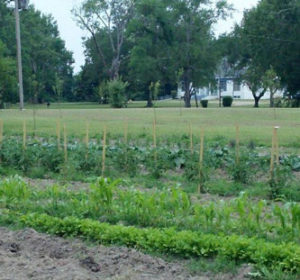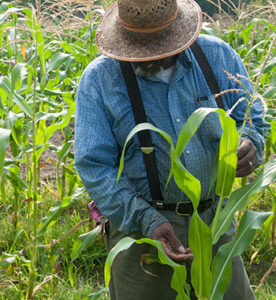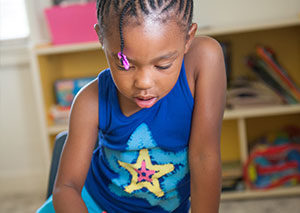UCC’s Franklinton Center at Bricks Provides Food in the Desert, and for the Soul, in Rural North Carolina

A small section of the 5-acre farm at Franklinton Center at Bricks.
A casual tourist might not regard the lush green foliage and landscape of Whitakers, N.C., as a desert, but the area — home to the United Church of Christ’s Franklinton Center at Bricks — is the second largest food desert in the United States. It also is located in Edgecombe County, one of the poorest in North Carolina.
As part of its mission to partner with the local community in transformational ways, Franklinton Center founded its Just Food Project in 2012. One focus of the project is the Center’s 5-acre farm. Just Food targets families with children ages 5 through 12, helping to provide them with fresh, organic produce grown on the farm.
The Center also offers cooking classes to teach children how to prepare the produce in healthy ways. Between 25 and 65 children and youth participate in the classes each week, and many show their parents what they’ve learned when they return home, says Vivian Lucas, director of the Center.

A farmer examines a field of corn.
The Just Food Project is about sustainable farming, too. It works with local small farmers to help them remain contributors to the community. The farmers meet monthly at the Center and receive training on how to produce their food in more efficient, year-round ways. Additionally, the initiative offers affordable fresh vegetables and produce grown at the 5-acre farm at a regular on-site farmers market, where local farmers can also bring their produce.
The whole community benefits, says Lucas. People “come from schools, families, churches, local agencies” and other area organizations to participate in the garden and buy food at the market, she says.
The Just Food Project recently embarked on a three-year plan to raise awareness of the connection between food, overall health, and an active, healthy workforce.
Feeding the Soul, Rooted in Advocacy
The mission of Franklinton Center is to promote social justice by empowering people through training, education, community development, and direct actions. It supports educational, cultural, environmental, nutritional, health-related, recreational, economic, and leadership development activities to improve the quality of life for local residents.

A participant in Franklinton Center’s LIteracy Project.
For example, the Center’s Literacy Project is designed to address far more than just the ability to read and write, says Lucas. The project also includes activities to teach speaking, listening, critical thinking, and creative learning, she says.
The strong advocacy mission at Franklinton Center is spurred on by the needs of the disadvantaged local community, says Lucas. The Center continues to build coalitions and partnerships with a variety of local health, education, and advocacy groups in order to expand its effectiveness in ministering to the community. It also collaborates with schools, churches, businesses and other organizations on activities that provide avenues to success for community members. Recent projects have included — among many others — partnering with a local elementary school to conduct a 5-day Family Literacy Retreat at the Center, as well as hosting meetings between Rep. G. K. Butterfield (D-N.C.) and black farmers.
Franklinton Center also has become a hub of change for local, national, and international groups looking for meeting space. Every group that visits the Center is afforded the opportunity for a local history lesson, which furthers the Center’s mission of creating the environment for transformational change.
The goal, says Lucas, “is to become a world class social justice retreat and conference center” that serves the global community, while still remaining “a center that reaches out locally to provide participants with the opportunities to become transformed and to transform others.”
Once a 19-century tobacco and cotton plantation known as “the place to break unruly slaves,” Franklinton Center at Bricks has emerged in the 21st-century from that pre-Civil War horror to become a regional and national advocate for educational opportunity and leadership development. The Center’s grounds include hotel- and dormitory-style rooms, as well as a retreat cottage for small groups, plus conference and break-out rooms. Contact Diana Allen for more information.
Join Our Mailing LIst
"*" indicates required fields
